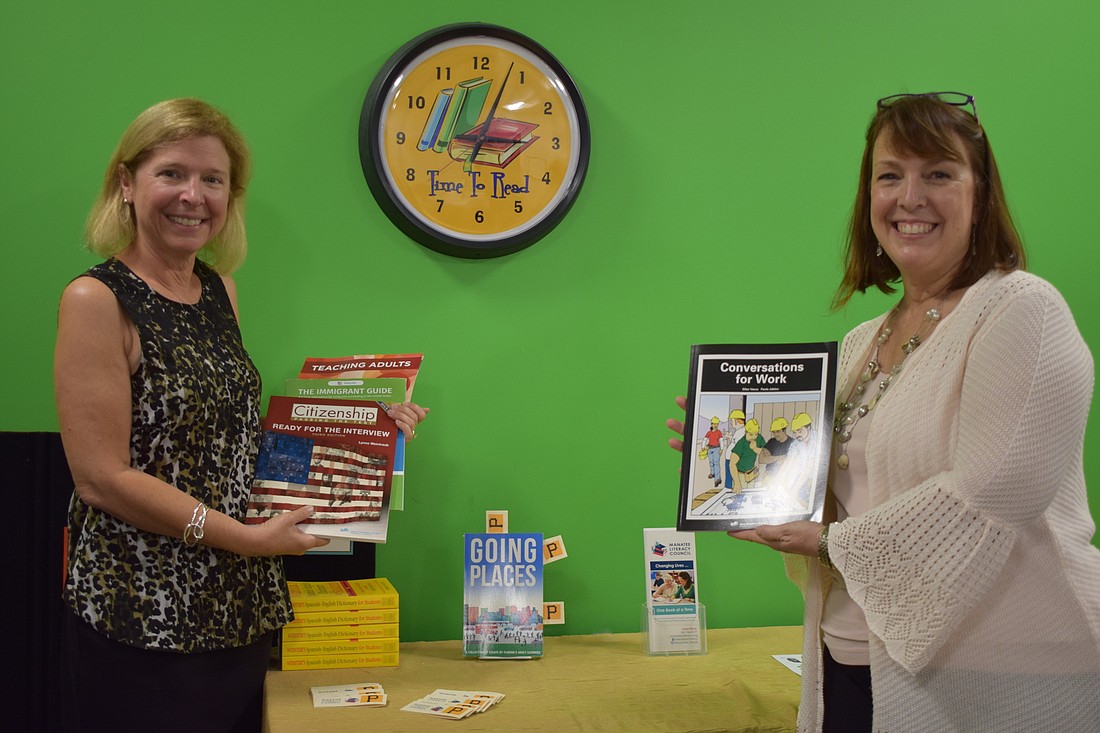- January 10, 2025
-
-
Loading

Loading

Lakewood Ranch’s Maria Alvarez knew that in order to get a job, she would need to become more proficient in English.
Although she was a psychologist in her home country of Venezuela, Alvarez said she wouldn’t be able to get a job in the same field in the U.S. because of the language barrier.
Since she moved to Lakewood Ranch in September 2020, Alvarez has been working as a nanny and delivery driver. She’s thinking about pursuing a career in massage therapy.
Alvarez started researching classes to help her learn how to speak and read in English and discovered the Manatee Literacy Council, a nonprofit dedicated to increasing the level of functional literacy in adults in Manatee County.
The Manatee Literacy Council has volunteers who work with learners one on one or in a group to develop their skills in speaking and reading in English, prepare learners for the U.S. citizenship test and more.
The nonprofit also offers conservation and workplace literacy classes. The council is developing programs for digital and financial literacy with the hopes of starting them in the summer and fall.
Michelle Desveaux McLean, the executive director of the Manatee Literacy Council, said the nonprofit is always in need of more tutors, especially since the pandemic began and several tutors decided to stop volunteering because they didn’t feel comfortable tutoring online.
There are currently 68 people on the council’s waitlist to become learners.
Country Club East’s Jeannine Abele started tutoring a small group of Manatee County residents a year ago and was able to meet twice with her group in person before being forced to move to virtual meetings.
“It was a huge change, especially for the learners,” Abele said.
Desveaux McLean said that in the past month she’s started to see volunteers return to the nonprofit as they’ve adjusted to communicating with others virtually.
Although Desveaux McLean can’t wait for tutors and learners to be able to meet in person again, she said the nonprofit will continue to provide online classes because it alleviates issues including transportation and child care for learners.
Alvarez said the conversation classes she participates in every week help her feel connected to others during the pandemic while growing her confidence in speaking to others.
In the conversation classes, participants will go over specific topics, such as banking and irregular nouns.
As a tutor, Abele said being a part of the program is a learning experience for her as much as it is for her learners.
Abele has grown an appreciation for English, and while she teaches her learners English, they help her learn Spanish.
“You learn so much about the language,” Abele said. “You learn so much about other people from other cultures and their challenges. I feel like I’m much more empathetic now to folks coming into our country trying to learn English now that I see how hard it is.”
Being a tutor doesn’t come without its challenges, though, Abele said.
“You’re trying to understand what their needs are and prepare the right kind of lessons for them to help meet their needs and to maximize that time you have together,” she said. “It’s challenging to come up with new, unique creative ways to teach. You want to see your learners smiling and having fun in class. To see them building confidence is rewarding.”
Tutors often develop relationships with their learners.
“When they come and ask you for help on things totally outside the class, you know you have a relationship there that they value and you value as a tutor,” Abele said.
Desveaux McLean and Abele both said it’s rewarding to see the growth their learners make while in the programs.
“I’ll never forget the look on people’s faces when they are so empowered to take charge of their own life, whether it’s being able to read a book to a grandchild or pass the citizenship test or get that new job,” Desveaux McLean said.